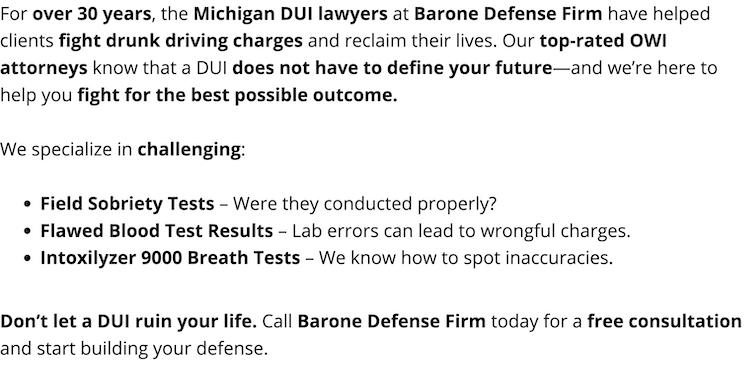Prescription Drug DUI
Many drivers in Michigan are unaware that they may be convicted of driving while intoxicated even if they had not consumed any alcohol, which shows what a major role a Michigan DUI drug lawyer can play in someone's case.
The state of Michigan has multiple charges associated with impaired driving, and you can be prosecuted if you are caught driving while under the influence of an illegal drug such as marijuana. In fact, you can be charged with impaired driving if you are found operating while under the influence of a prescription medication—even if you have a prescription for it.
OWI and OWVI
There are many prescription medications that can cause intoxicating side effects, especially when taken in higher doses. Even if you have a prescription for a particular medication, if you are found to be too impaired to safely drive as a result of taking it, you can be charged with OWVI or OWI.
- Operating While Visibly Impaired (OWVI) means that your ability to safely operate the motor vehicle was visibly less than that of an ordinary person, due to the consumption of alcohol or other drugs—including prescription medications.
- Operating While Intoxicated (OWI) means that your ability to safely operate the motor vehicle was substantially affected by the consumption of alcohol or drugs.
Perscription Drug DUI Penalties
If you are convicted of Operating While Visibly Impaired in Michigan and it is your first offense, you could face the following penalties:
- A fine of up to $300
- Jail sentence of up to 93 days
- Up to 360 hours of community service
- Restricted driver's license for 90 days
- Four points on your Michigan state driving record
- A Driver Responsibility Fee of $500 for two years
Prescription Medications with Intoxicating Side Effects
The following prescription medications can have intoxicating side effects, even when taken in the prescribed dose:
- Adderall
- Ambien
- Codeine
- Morphine
- Oxycontin
- Percocet
- Ritalin
- Valium
- Xanax
- Zoloft
Ambien and Other Sleep Aids
Over the past several years, prescription-strength sleep aids such as Ambien have become increasingly popular. Along with the rise in use of these drugs has come an increase in incidents of "sleep driving." Unfortunately, simply having a prescription for a sleep aid will not save you from being charged with impaired driving if you are caught operating a motor vehicle while under the influence of these powerful drugs.
It has long been established that prescription sleep aids can lead to a hypnotic state during which the user is not fully conscious of his or her actions and has no recollection of the events after waking. There have been countless documented cases of users getting out of bed to eat, drink, and even drive while under the effects of Ambien and other prescription drugs.
Many people are surprised to learn that they can be arrested if they are found driving while impaired by Ambien or another medication. Michigan law states that it is illegal to operate a motor vehicle if your ability to safely do so is lessened by alcohol or drugs, regardless of whether they are prescribed to you.
 Barone Defense Firm Home
Barone Defense Firm Home
















